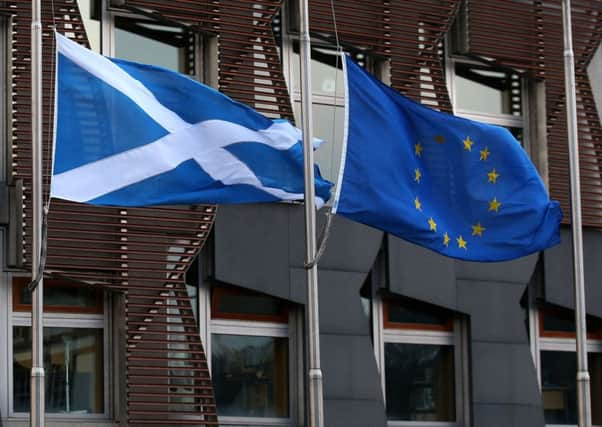MSPs will get the chance to vote down key Brexit bills


Devolved assemblies are set to be given a vote on aspects of the Repeal Bill, which will transfer EU legislation into UK law.
While MSPs won’t be able to block the legislation, a defeat for the government would deal a damaging blow to a Prime Minister whose administration is reeling.
Advertisement
Hide AdAdvertisement
Hide AdYesterday’s Queen’s Speech unveiled a programme for the next two years with just 27 pieces of legislation in it, eight of which relate to Brexit.
SNP Westminster leader Ian Blackford attacked planned agriculture and fisheries bills as a “great power grab”, saying legislation to set up new post-Brexit rural payments systems and environmental controls would infringe on areas that are devolved to Scotland.
Shorn of her majority and facing the prospect of governing at the head of a minority as talks on a ‘confidence and supply’ deal with the Democratic Unionist Party falter, Mrs May set out a slimmed-down agenda that abandoned many of the key pledges in the controversial Conservative manifesto, with the shadow chancellor John McDonnell claiming the document had effectively been “shredded”.
Means-testing of winter fuel payments and free school meals in England has been abandoned, as has the proposed ‘Dementia Tax’ that would have reclaimed assets from pensioners after their death to pay for their social care.
It is not clear whether the Tories will press ahead with a proposed cap on energy prices, and the speech delivered by Queen Elizabeth also failed to mention the target of reducing net migration to below 100,000, signalling the policy may be downgraded.
Donald Trump’s state visit to the UK was also omitted, suggesting it might not take place over the two-year parliamentary session, although Downing Street sources said this was because a date had yet to be agreed.
The Prime Minister confirmed that “there is a possibility that a legislative consent motion may be required in the Scottish Parliament, but that is a matter that is being considered currently between the Westminster and the Scottish government.”
A Downing Street spokesman was later quoted adding: “We would hope that everyone would get behind delivering on the will of the British people.”
Advertisement
Hide AdAdvertisement
Hide AdThe Scottish Government’s Brexit minister Michael Russell said there was “absolutely no question” of any powers in devolved areas being held at Westminster after Brexit, and insisted that MSPs must be given a vote on all Brexit legislation affecting Scotland.
Mr Russell said: “It is deeply concerning that the UK Government seems to intend that repatriated powers in devolved areas like agriculture should go by default to Westminster, with no clear recognition of the need for the consent of the Scottish Parliament under the Sewel Convention for such changes.
“This is clearly unacceptable.”
Mrs May said Britain had been through “an unsettling time which has tested the spirit of our country” and its response must be “compassion, unity, resolve”.
“The Queen’s Speech on its own will not solve every challenge our country faces,” she said. “But it is a step forward to building a more compassionate, more united and more confident nation.”
Labour leader Jeremy Corbyn, fired up by his party’s shock gains at the general election, dismissed the programme as “thin gruel” which showed the Conservatives were running out of ideas.
“This is a Government without a majority, without a mandate, without a serious legislative programme, led by a Prime Minister who has lost her personal authority and is struggling even today to stitch up a deal to stay in office,” he said.
But his claim to head a “government in waiting” was mocked by the Prime Minister, who he had “fought a spirited campaign and come a good second”.
The Queen’s Speech set out the government’s priority to “build a more united country, strengthening the social, economic and cultural bonds between England, Northern Ireland, Scotland and Wales”.
Advertisement
Hide AdAdvertisement
Hide AdBut Mr Blackford said there was “nothing in the programme to try and turn around the faltering economy, or how to support our under-pressure public services”.
He said: “No one can have any confidence in this Tory government’s ability to speak on Scotland’s behalf in the vital Brexit negotiations - this makes it all the more vital that Scotland is given a seat at the negotiating table.”
The Liberal Democrats warned they would seek to derail Mrs May’s Brexit plans by bringing an amendment calling for the UK to stay in the European single market when the government’s programme is voted on next week.
The party could also try and force the government’s hand in the House of Lords, where they have more than 100 peers.
The Lib Dems argue that many of the measures in the Queen’s Speech do not have the protection of a convention that prevents the Lords overturning legislation based on manifesto commitments.
Lib Dem chief whip Alistair Carmichael said the eight Brexit-related bills promised in the speech would not be covered by the so-called Salisbury Convention.
“What we are seeing now is the opportunity for Parliament to control the Government,” he said.
Mr Carmichael said: “It seems to me the Government today has just fed its manifesto into a shredder and in doing that it looks difficult to see how they are going to get much through the House of Lords if they continue to pretend that it is business as usual.”
Advertisement
Hide AdAdvertisement
Hide AdAnd he claimed the eight Brexit bills “in their content and their substance .... don’t have legitimacy from the manifesto”.
Mr Carmichael, a Cabinet colleague of Mrs May in the coalition government, said she would stick to her position “like a limpet to a rock”.
“That approach, even within Government never mind across Parliament, is simply no longer fit for purpose,” he said.